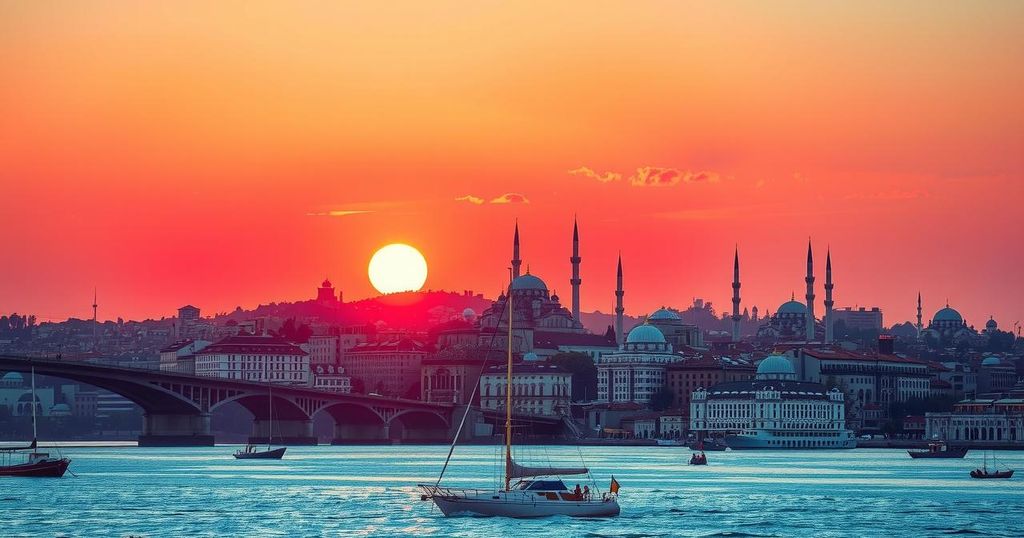Istanbul Talks Showcase Turkiye’s Role in Russia-Ukraine Conflict

Turkiye hosted talks between Russia and Ukraine in Istanbul, navigating its ties with both countries despite the absence of direct engagement from Putin. The meeting, a notable diplomatic event, focused on issues such as a prisoner swap agreement. Analysts see Turkiye’s balancing act as a diplomatic win, further securing its role as a key negotiator amid complex geopolitical challenges.
Last week in Istanbul, Turkiye attempted a diplomatic balancing act between Russia and Ukraine, navigating its dual support for Kyiv while maintaining ties with Moscow. Originally, expectations were high for a face-to-face meeting between Russian President Vladimir Putin and Ukrainian President Volodymyr Zelenskyy, a first since the war began in 2022. However, with Putin confirming he would not attend, the meeting instead focused on delegations from both countries and a prisoner swap agreement. It marked the first direct discussions since the conflict erupted over 19 months ago.
The series of talks in 2022, also hosted by Turkiye, underscored the nation’s crucial role in seeking a resolution to this major geopolitical crisis. This time, analysts view Turkiye’s role as inherently positive, despite the lack of a definitive agreement stemming from the recent discussions. Ziya Meral from the Royal United Services Institute (RUSI) emphasized, \”Turkiye stands to win diplomatically whichever way the talks go.\” He noted the significance of Ankara being positioned to engage both the U.S. and Russia, as well as Ukraine, showcasing its diplomatic prowess.
Over the past decade and a half, Turkiye has crafted its image as a key diplomatic player, expanding its influence far beyond its borders, particularly throughout Africa and the Middle East. Omer Ozkizilcik from The Atlantic Council highlighted Turkiye’s unique approach to mediation that began independently of the U.S. soon after Russia invaded Ukraine, identifying it as a new model for negotiations in such conflicts.
Traditionally, neutral states like Switzerland played the role of mediators, but under this refreshed dynamic, Turkiye is now negotiating from a position of significant geopolitical interest, which includes supplying Ukraine with drones and having a military presence in Somalia. This shift indicates a broader Turkish strategy to emerge as a powerful regional diplomat, according to Ozkizilcik.
Navigating relations with Russia has been less than straightforward for Turkiye, particularly with its opposition to Moscow’s aggressive actions in the Black Sea. Turkiye labeled Russia’s actions in Ukraine a “war” soon after the invasion, enabling it to act under the Montreux Convention, effectively restricting Russian naval movements. Furthermore, Turkiye and Russia have found themselves on opposing sides in conflicts in Libya and Syria, complicating their relationship.
In past years, relations between the two nations have oscillated between cooperation and tension. For instance, Turkiye shot down a Russian jet in 2015, an incident that spiraled into a significant diplomatic rift, yet, within a year, both sides managed a rapprochement. Despite Turkiye providing military support to Ukraine, Russia has largely allowed these actions to continue, maintaining economic and diplomatic ties with Ankara.
Turkiye’s strategic cooperation with the West has also strengthened since the war began, especially seen in its role in a grain shipping deal for Ukraine’s sea exports last year. Yet, amidst all this, Turkiye has advocated for the rights of the Crimean Tatars, reinforcing its friendship with Ukraine. Zelenskyy has openly acknowledged Turkiye’s diplomacy and cooperation, thanking Turkish President Recep Tayyip Erdogan for his support.
With this conference, Turkiye adds to its prestige, aiming for greater visibility on the global stage. Steven Horrell suggested that successful talks could bolster Turkiye’s standing among both Russia and Ukraine, establishing it further not just as a regional but a global leader as well. This diplomatic endeavor serves Turkiye’s interest of upholding its relationships with both sides while pursuing its goals in a complex regional landscape.
In summary, Turkiye’s recent diplomatic maneuvering in Istanbul showcases its delicate balancing act between Russia and Ukraine amidst ongoing conflict. While missed opportunities for direct engagement between Putin and Zelenskyy highlighted the current challenges, the Istanbul talks marked a significant moment in diplomatic relations. Turkiye’s evolving role as a key negotiator illustrates its commitment to fostering peace while simultaneously navigating intricate geopolitical dynamics, ultimately enhancing its position as a regional and global player. Turkey’s adeptness in accommodating both parties positions it for further diplomatic success as the situation unfolds.
Original Source: www.aljazeera.com







